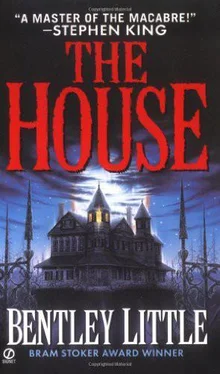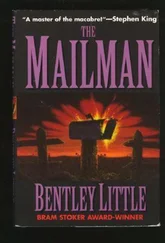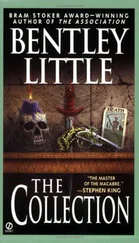"No, it's not a crime. But you don't usually go to all this trouble unless you want something. Or . . ." He looked at her. "Did you have an accident? Is the car dented?"
She glared at him. "That's insulting. I told you, I was just in a good mood." She paused. "Was."
They stared at each other for a moment, then Carole turned and strode back into the kitchen. Norton sat down to eat. The food looked delicious, and he piled his plate high with generous helpings of everything. Carole returned, placing a glass of milk before him.
They ate for a while in silence, a welcome change and a state of affairs he thoroughly enjoyed, but Carole was obviously discomfited by the lack of conversation, and she finally broke down.
"Don't you even want to know why I'm in a good mood? Why I'm happy?"
He sighed. "Why are you happy?"
"Because we had our first CLO meeting of the season."
"So what are you doing this year? Annie again? The world always needs more amateur productions of Annie.'"
She slammed her fork down on the table. "You pompous ass."
"What are you talking about?"
"Why do you always have to belittle everything that I do?"
"I don't belittle everything you do."
"What do you call it, then?"
"I'm not--"
"Not what? Criticizing? You sure the hell are. And for your information, we're doing Sondheim's Company this year." She glared at him. "And don't you dare say we don't have the talent for it."
"I wasn't going to," he said.
But he was. That was exactly what he'd been about to say. And he was only able to claim the high road now because she talked faster than he did and hadn't allowed him to put his foot in his mouth.
Why did he do this? he wondered. What compelled him to attack her, to disparage her abilities, to mock her accomplishments, to denigrate everything she did?
It wasn't that he thought himself superior, as she often suggested. It wasn't that he felt inferior and belittled others in an attempt to make up for it, either. No, it was simpler than that. Simpler, and at the same time, more complex.
He liked to hurt people.
The ants.
He took a deep breath, stared down at his mashed potatoes. It was a hard admission to make, a clear-eyed yet withering self-assessment, an understanding of himself that he'd rather not possess. Not many people could recognize or acknowledge such a base and reprehensible motive Jesus, he thought. He was even using this as fodder for self-congratulation, complimenting himself for recognizing that he was a bastard.
What the hell was wrong with him?
It had all started with those damn ants.
He looked across the table at Carole. "I'm sorry," he said. "I'm . . . I've just had a bad day."
"It's not only today," she told him.
"I know, I know--"
"No. You don't know."
"What do you want me to do, Carole? I said I'm sorry."
"You're an arrogant, self-centered jerk sometimes."
CCT___??
"I don't want to talk to you right now, Nort . Just shut up and eat your dinner."
They finished the rest of the meal in silence, and afterward he went out into the living room to watch a documentary on the Civil War on A&E while she retreated into the kitchen.
He finished grading the last test paper and put it on the pile, shaking his head. He hadn't had high expectations to begin with, but the scores were even worse than he thought they'd be.
Kids seemed to be getting dumber and dumber each year.
He sighed, grabbed his cup, finished off the last lukewarm swallow of coffee. They weren't really stupid, these students, but they weren't educated and had no desire to be so. They had no intellectual guidance, no one to tell them what they should know and why they should know it. "The post-literate generation," he'd heard them called, and that was as good a description as any. They did not read, were not conversant with the essential facts and ideas at the core of Western culture, were not even up on current events, but they had an encyclopedic knowledge of twenty-year-old television shows and bad popular music. Even his best students were smart in the wrong way: media-savvy kids who dealt in trivia, the intellectual currency of their time.
It was a sad state of affairs.
Norton rubbed his tired eyes, looked up at the clock over the bookcase. Midnight. Carole had gone to sleep several hours ago, and he should have too, but there'd been that Civil War show and then these tests to grade, and now it was already Thursday. He stood, stretched.
He could've done what most of his colleagues did and postponed the grading for another day. Or he could have given a scantron test instead of an essay test and let the machine grade them.
But he wasn't about to sacrifice his principles, to change his teaching habits for the sake of expediency, and though he was bone-tired and would only be able to catch a few hours of sleep, at least he could face himself in the morning.
He walked into the kitchen, put his cup in the dishwasher, then walked down the hallway to the bathroom to take out his bridge.
Carole was dead asleep and snoring when he went into the bedroom, and she did not wake up even when he turned on the light. He took off his clothes, carefully folded them, and placed them on the cedar chest at the foot of the bed, then once again turned off the light. He felt his way through the darkness over to the bed, lifted the covers, and got in.
Carole moaned, stirred, rolled over.
Her body felt warm next to his, almost hot. She often called him a "corpse" because of their difference in body temperatures, and he had to smile when she said that because it wasn't too far off the mark. He was getting on in years, and a lifetime of soft self-indulgence had probably made his body even more decrepit than it ordinarily would be. He was old and he knew it, and he wouldn't be surprised when his heart or his liver or one of his other organs started to give out.
Carole was quite a bit younger than he was, forty five to his sixty-two, and there was something comforting about knowing that he would die first. It was selfish, of course, but he'd always been selfish to a certain extent and the charge didn't bother him. He wouldn't have to carry on without her, wouldn't have to make another seismic shift in his life. It would be hard on her, of course, but she was stronger than he was, she could handle it. Hell, she'd probably remarry.
So why was he such a prick to her?
He wasn't a prick all the time. Even she had to admit that. He'd been head over heels for her when they'd first married, and while the passion may have cooled, he did still love her. Only these days, he seemed to be annoyed by her more often than entranced, easily irritated by her behavior, what she said and what she did consistently rubbing him the wrong way. He didn't know why. It was probably his fault. He didn't think she had changed over the years. But he had. Something in his life had shifted, some nascent gene of solitary bachelorhood kicking in as he got older, making him prefer to remain alone rather than in the company of others. There'd been a settling in his ways, a hardening of his attitudes, and though he still loved Carole, still cared about her, still needed her, it had become increasingly hard to like her, to be with her.
He glanced next to him. She remained very attractive, though. Even in sleep, even with her mouth open, her hair wild, face cream clumped on her cheeks, chin and forehead, she was an extremely pretty woman. And he could not imagine going to bed without her stretched out beside him. He still enjoyed being with her when she was awake as well--it was talking to her that was becoming increasingly difficult. When they sat alone in a room, he reading, she sewing, one or both of them watching TV, each performing separate activities, it was nice. Only talk brought out their differences, only conversation brought out his annoyance and hostility, made him feel that perhaps he should have remained a single man.
Читать дальше












